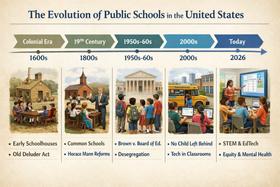Serving 309 students in grades Prekindergarten-5, Marlton Elementary School ranks in the bottom 50% of all schools in Maryland for overall test scores (math proficiency is bottom 50%, and reading proficiency is bottom 50%).
The percentage of students achieving proficiency in math is 6-9% (which is lower than the Maryland state average of 27%). The percentage of students achieving proficiency in reading/language arts is 30-34% (which is lower than the Maryland state average of 45%).
The student-teacher ratio of 13:1 is lower than the Maryland state level of 14:1.
Minority enrollment is 99% of the student body (majority Black), which is higher than the Maryland state average of 68% (majority Black).
Quick Facts (2026)
- Grades: Prekindergarten-5
- Enrollment: 309 students
- Student-Teacher Ratio: 13:1
- Minority Enrollment: 99%
- Overall Testing Rank: Bottom 50% in MD
- Math Proficiency: 6-9% (Btm 50%)
- Reading Proficiency: 30-34% (Btm 50%)
- Science Proficiency: 20-29% (Btm 50%)
- Source: National Center for Education Statistics (NCES), MD Dept. of Education
Top Rankings
Marlton Elementary School ranks among the top 20% of public schools in Maryland for:
Category
Attribute
Community Size
School Overview
Marlton Elementary School's student population of 309 students has stayed relatively flat over five school years.
The teacher population of 23 teachers has stayed relatively flat over five school years.
Grades Offered
Grades Prekindergarten-5
(Supplemental Virtual)
(Supplemental Virtual)
Total Students
309 students
Gender %
Total Classroom Teachers
23 teachers
Year Founded
1990
School Rankings
Marlton Elementary School ranks within the bottom 50% of all 1,338 schools in Maryland (based off of combined math and reading proficiency testing data).
The diversity score of Marlton Elementary School is 0.22, which is less than the diversity score at state average of 0.74. The school's diversity has stayed relatively flat over five school years.
Overall Testing Rank
#1033 out of 1338 schools
(Bottom 50%)
(Bottom 50%)
Math Test Scores (% Proficient)
6-9%
27%
Reading/Language Arts Test Scores (% Proficient)
30-34%
45%
Science Test Scores (% Proficient)
20-29%
36%
Student-Teacher Ratio
13:1
14:1
American Indian
n/a
n/a
Asian
1%
7%
Hispanic
10%
23%
Black
88%
33%
White
1%
32%
Hawaiian
n/a
n/a
Two or more races
n/a
5%
All Ethnic Groups
Participates in the National School Lunch Program (NSLP)
Yes
Eligible for Free Lunch
53%
44%
Eligible for Reduced Lunch
6%
5%
School Statewide Testing
School District Name
Source: National Center for Education Statistics (NCES), MD Dept. of Education
School Notes
- School Mascot: Mustangs
Frequently Asked Questions
What is Marlton Elementary School's ranking?
Marlton Elementary School is ranked #1033 out of 1,338 schools, which ranks it among the bottom 50% of public schools in Maryland.
What schools are Marlton Elementary School often compared to?
Marlton Elementary Schoolis often viewed alongside schools like Mattaponi Elementary School by visitors of our site.
What percent of students have achieved state testing proficiency in math and reading?
6-9% of students have achieved math proficiency (compared to the 27% MD state average), while 30-34% of students have achieved reading proficiency (compared to the 45% MD state average).
How many students attend Marlton Elementary School?
309 students attend Marlton Elementary School.
What is the racial composition of the student body?
88% of Marlton Elementary School students are Black, 10% of students are Hispanic, 1% of students are Asian, and 1% of students are White.
What is the student-teacher ratio of Marlton Elementary School?
Marlton Elementary School has a student ration of 13:1, which is lower than the Maryland state average of 14:1.
What grades does Marlton Elementary School offer ?
Marlton Elementary School offers enrollment in grades Prekindergarten-5 (Supplemental Virtual).
What school district is Marlton Elementary School part of?
Marlton Elementary School is part of Prince George's County Public Schools.
School Reviews
Review Marlton Elementary School. Reviews should be a few sentences in length. Please include any comments on:
- Quality of academic programs, teachers, and facilities
- Availability of music, art, sports and other extracurricular activities
Recent Articles

Do We Still Need Libraries in Public Schools in 2026
An updated look at the role of public school libraries in 2026, their impact on literacy, equity, and digital learning, and why they remain essential today.

The History of Public Schools in the United States
Explore the history of public schools in the U.S., from colonial roots to 2026 reforms shaping equity, funding, and classroom innovation.

Special-Program Registration Deadlines Explained
Learn what to know about special-program registration deadlines for magnet, CTE, and dual-enrollment options in public schools.





